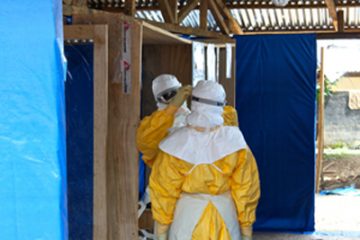I’m goin’ in

Scene from an Ebola treatment facility run by Médecins Sans Frontières (MSF) in Guéckédou, Guinea. Source: United Nations
So, what can be accomplished in EMC entries of less than 1 hour for extremely ill patients that cannot be properly examined or tested and who have a disease with no treatment and 70% mortality? That’s a good question. From the population and public health point of view, I think that the primary benefit is isolation – removing Ebola infected patients from the general population so they can no longer infect others and propagate the epidemic. From a clinical point of view, most of the interventions are supportive nursing care such as cleaning the patients, encouraging and assisting them to eat and take fluids, changing dressings, hanging new bags of IV fluids, making sure they take their oral medications and providing compassion and support.
But, the Ebola patients also have specific medical needs that usually fall into the category of ‘doctor interventions’. These include an initial assessment of the seriousness of the clinical condition and grading patients on a scale of 1 to 5. The doctors also evaluate for coexisting medical conditions, especially those that require treatment. For instance, in addition to the 24 standard Ebola symptoms such as diarrhea and vomiting, we currently have patients who also have bedsores, conjunctivitis, vaginal discharge, post-partum vaginal bleeding, persistent fevers, severe cough, pleurisy, malaria and Lassa Fever. The doctors also treat everyone according to MSF guidelines for malaria with Co-artem, provide a broad-spectrum antibiotic, usually cefixime) to all admissions and prescribe treatment for diarrhea, vomiting, pain and anorexia as needed. Patients who are Ebola grade 5 also require morphine for palliative care. Everyone also gets multivitamins and most receive plumpy nut (a peanut-based, high calorie, nutritional supplement). There are also several children who need special attention.
Drawing blood and starting IVs are done by the expats and the 1 national staff member trained and certified for these risky interventions. The only blood test we perform is the Ebola PCR but female patients often have a urine pregnancy test at some point. We have a CDC lab onsite for the PCR. Deciding when to start an IV and successfully inserting an intravenous cannula for dehydrated and sometimes agitated patients while dressed in full PPE is obviously a very big deal. Sierra Leoneans have very dark skin so this makes visualization of veins that much harder. The Ebola viral load in blood is extremely high so this procedure can be dangerous. I am told that the likelihood of acquiring Ebola after an accidental needle stick is near 90%. Many of the national staff have performed these procedures prior to Ebola and there is some resentment that they can no longer do this. We have 9 patients on IV fluids at the moment and this can be a very important intervention to treat the severe dehydration that is often present. Many patients cannot take oral fluids because of persistent vomiting.
Well, my training stopped yesterday and today I will be the only doctor on the ‘day shift’ – 10 am to 6 pm. We had 57 patients yesterday and we are expecting 6 new admissions today. I’m pretty nervous but there are lots of skilled national staff and nurses around to hold my hand.
More later…..